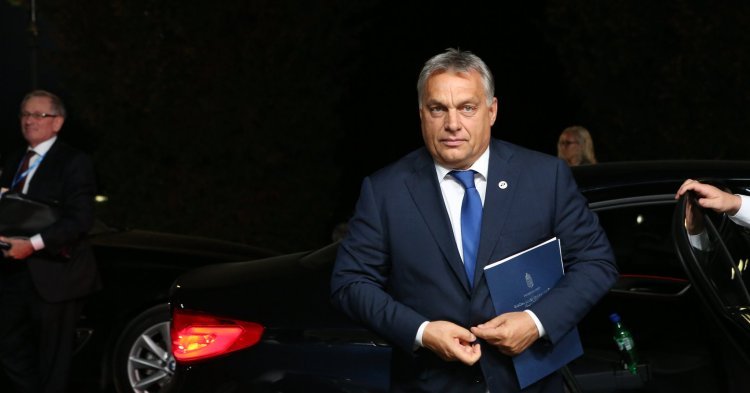Orbán’s political career has been consistently characterized by national support and international reluctance. The Hungarian people have elected him Prime Minister in four consecutive occasions, yet his policies are heavily criticized – especially by western-European countries. He has faced repeated proceedings involving his party - the Hungarian Civic Alliance (Fidesz) - and its membership of the European People’s Party (EPP), and his fundamental rights violations have been scrutinised under the Article 7 TEU procedure. His position in Hungary, however, seems bulletproof.
An excursus on Hungarian history
Budapest, 1989: During the solemn re-burial of Hungarian national hero Imre Nagy, a speaker belonging to the university youth urged the government to call for the withdrawal of Russian troops. Viktor Orbán, a 26-year-old student at the time, stated that communists would not be welcome at this ceremony. Orbán made a name for himself with this controversial speech. In order to understand what made Nagy a national hero and why Orbán was able to assert his position, a look into the earlier history of the country is worthwhile.
At the Crimea Conference in February 1945, the Soviet Union gained control of Hungary. Up until 1953, a Stalinist political orientation prevailed and was fuelled by Prime Minister Mátyás Rákosi, who was also the head of the Hungarian Working People’s Party (MDP). In 1953 he was subbed out as prime minister for his party’s colleague Imre Nagy. The latter’s call for a “national and human socialism” caused a struggle for power within the party. Thou it did not pay off for Nagy, who lost this. In April 1955 he was removed from his duties in the MDP, dismissed as prime minister and excluded from the party.
Disappointed by the subsequent public policy, numerous students decided to protest in October 1956. The protests evolved into a national uprising in demand of the reinstatement of Imre Nagy as Prime Minister. Nagy acknowledged the revolution officially and days later, on November 1st, 1956, he proclaimed the neutrality of Hungary and abrogated membership in the Warsaw Pact which had been designed as an antithesis to the NATO-alliance during the Cold War making it of enormous importance for the Soviet Union.
Displeased by Nagy’s political actions, Soviet forces furiously quelled the riots. Nagy tried to flee and sought refuge at the Yugoslav Embassy for three weeks. After he was guaranteed impunity, he left the Embassy but was detained by the KGB (Soviet ‘State Security’). On June 16th 1958, he was convicted of treason and attempted overthrowing of the “democratic political system” and sentenced to death by hanging – he was executed on the same day in the Budapest prison.
The Hungarian Socialist Worker’s Party (MSZMP) tolerated the first attempts at liberation in the following years. After a few years of the party’s ruling, the republic of Hungary proclaimed its independence from the Soviet Union. Following this political turning point, Nagy was officially rehabilitated and ceremoniously buried in Hungary. This event was also where Viktor Orbán held his famous speech on stage. His speech was not uncontested by the Fidesz party, which he had co-founded. However, Orbán asserted himself and was soon considered a candidate for the position of the prime minister.
Orbán’s political rise
Shortly after in 1998, Orbán was elected Prime Minister, but lost the office, only one term into the job, to the Hungarian Socialist Party (MSZP), which formed a coalition alongside the Alliance of Free Democrats (SZDSZ). Following this political defeat, the Fidesz party chose a polarising strategy: it denounced Orbán’s ousting from office as theft by a coalition of communists and left-wing forces which, after Hungary’s transition, had allegedly gained influential positions in vital public sectors such as the media.
Following the government (consisting of the MSZP and the SZDSZ)’s re-election in April 2006, Prime Minister Ferenc Gyurcsány was subject to a calculated attack. Recordings in which he called Hungary a “shit country”, and added that the government allegedly had lied about the country’s economic situation “all the time, from morning to night", were leaked.
Gyurcsány’s works sparked nationwides protests and violent riots, and the MSZP lost almost 24 per cent of votes in the 2010 election. While the right-wing party Jobbik was able to claim most of the party’s losses (more than 14 per cent of the votes), the coalition made up of Fidesz and KDNP (Christian Democratic People’s Party) obtained a two-third majority in parliament. Orbán was elected Prime Minister that very year, and re-elected in both 2014 and 2018.
Orbán is perceived as a strong statesman who was able to bring an end to recession and create a new national sentiment for the Hungarian people. He gained a lot of sympathy, for example, by offering citizenship to Hungarian minorities living in territories which had been handed over to other states after World War I. Other states, however, were critical about this move: in response, the Slovakian government announced that Slovakians applying for Hungarian citizenship would have to trade off their Slovakian passport.
A new Hungarian constitution
Orbán’s government took immediate action: in the first 18 months following Fidesz’s electoral victory, it passed 360 new laws. Some were immediately criticised by the international community: one of its 2010 laws, for example, allows both private and state media to be monitored by supervisory authorities, who are linked directly to parliament.
Only two years after Orbán had become Prime Minister, on January 1st, 2012, a new constitution came into effect. Its preamble was titled the ‘National Creed’. God and Christianity were given central importance. Today, Orbán uses this constitution, for example, to describe the “classical family” (i.e. the heterosexual nuclear family) as exclusively worth of political and social support. The new constitution also states that only the President, the government, or a group of at least a quarter of parliamentarians can file a complaint with the constitutional court. Previously, any Hungarian was able to request a constitutional review.
Only a year later, further constitutional amendments were passed. The constitutional protection of families was limited to heterosexual couples with children. Through “study contracts”, Hungarian students were obliged to stay in Hungary for twice as long as they had studied after their graduation. Otherwise, large supplementary payments were threatened. By raising some existing laws to constitutional status, the use of “public spaces for residential purposes” was made a punishable offence and election advertising on private television and radio was prohibited. Both laws had previously been classified as unconstitutional by the Hungarian Supreme Court. Orbán’s vast constitutional amendments, however, enabled the law to be passed anyway.
Hungary’s rule of law
Orbán’s policies not only sparked concerns: they have led to serious accusations. In 2018, the Commission initiated rule of law proceedings against Hungary. The proceedings, in line with Article 7 of the EU Treaties, are the toughest means to intervene in an EU Member State which is believed to have violated the EU’s fundamental values. In extreme cases, such proceedings can lead to the withdrawal of voting rights in the Council of Ministers.
The proceedings were initiated in response to a report issued by the European Parliament, which had detected restrictions on freedom of expression, research and assembly in Hungary. Furthermore, it identified the weakening of the constitutional and judicial system and the violation of minority rights. Orbán rejected these claims and proclaimed himself a protector of minorities. As an example, he referred to offering citizenship to Hungarian minorities in foreign territories. Orbán claimed that the proceedings would only be issued in order to punish the Hungarian people for not wanting to become a recipient of mass immigration. Hungary and Slovakia had previously filed a suit, which was duly dismissed by the European Court of Justice, against the EU’s quota system for the admission of refugees at the European Court of Justice (ECJ). Orbán claimed that there was “no reason for Hungary to change our policy of rejecting refugees.”



Follow the comments: |
|
